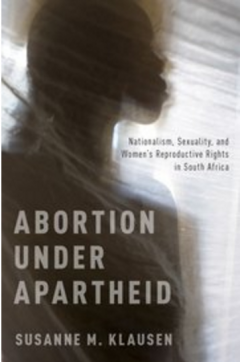Susanne Klausen interviewed by NOTCHES

Associate Professor Susanne Klausen is interviewed by Nicole Bourdonnais in a recent post in NOTCHES. NOTCHES is a peer-reviewed, collaborative and international history of sexuality blog that aims to get people inside and outside the academy thinking about sexuality in the past and in the present. Since its launch in January 2014, NOTCHES has attracted over 200,000 views, been profiled on About.com’s Sexuality site, the History News Network, and Freshly Pressed three times by WordPress.
Below is a short excerpt with the full article on the “Abortion Under Apartheid: Susanne Klausen on Nationalism, Sexuality, and Women’s Reproductive Rights in South Africa” interview available online.
In her groundbreaking book, Abortion Under Apartheid: Nationalism, Sexuality, and Women’s Reproductive Rights in South Africa, Susanne Klausen tells the story of ongoing attempts to regulate women’s sexuality in apartheid-era South Africa (1948-1990). During these decades, women of all races and ages faced barriers when choosing to end a pregnancy. Klausen carefully teases out the impact of race in shaping the distinct experiences of black and white women who sought abortions, during a period in which the ruling Afrikaner National Party aimed, above all else, to preserve the existing system of white supremacy.
The winner of the Canadian Committee on Women’s History’s award for the best book published in Women’s and Gender History, and the Joel Gregory Prize for the best work published in African Studies, Klausen’s study is the first scholarly monograph on the history of abortion in any African country. Offering an insightful analysis of legal and hospital records, as well as new interviews with key actors who were directly impacted by the criminalization of abortion, Abortion Under Apartheid demonstrates that the regulation of women’s reproductive bodies was central to the making and maintenance of apartheid in South Africa.